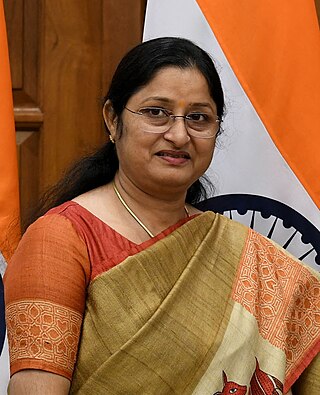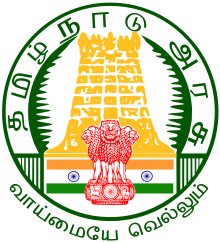
The Mid Day Meal Scheme is a school meal programme in India designed to better the nutritional status of school-age children nationwide. The scheme has been renamed as PM-POSHAN Scheme. The programme supplies free lunches on working days for children in government primary and upper primary schools, government aided Anganwadis, Madarsa and Maqtabs. Serving 120 million children in over 1.27 million schools and Education Guarantee Scheme centres, the Midday Meal Scheme is the largest of its kind in the world.

Muthuvel Karunanidhi Stalin is an Indian politician serving as the 8th and current Chief Minister of Tamil Nadu since 2021. The son of the former Chief Minister M. Karunanidhi, Stalin has been the president of the Dravida Munnetra Kazhagam (DMK) party since 28 August 2018. He served as the 45th Mayor of Chennai from 1996 to 2002 and the 1st Deputy Chief Minister of Tamil Nadu from 2009 to 2011. Stalin was placed 24th on the list of India's Most Powerful Personalities in 2022 by The Indian Express.

A school meal is a meal provided to students and sometimes teachers at a school, typically in the middle or beginning of the school day. Countries around the world offer various kinds of school meal programs, and altogether, these are among the world's largest social safety nets. An estimated 380 million school children around the world receive meals at their respective schools. The extent of school feeding coverage varies from country to country, and as of 2020, the aggregate coverage rate worldwide is estimated to be 27%.

Krishna Tirath is an Indian politician from INC. She was a member of the 15th Lok Sabha of India representing the North West Delhi constituency of Delhi. She was Minister of State in Ministry of Women and Child Development in the second Manmohan Singh ministry. She left the Indian National Congress (INC) political party, and on 19 January 2015 she joined Bharatiya Janata Party (BJP). Later on in March 2019 she rejoined the Indian National Congress.
India has a robust social security legislative framework governing social security, encompassing multiple labour laws and regulations. These laws govern various aspects of social security, particularly focusing on the welfare of the workforce. The primary objective of these measures is to foster sound industrial relations, cultivate a high-quality work environment, ensure legislative compliance, and mitigate risks such as accidents and health concerns. Moreover, social security initiatives aim to safeguard against social risks such as retirement, maternity, healthcare and unemployment while tax-funded social assistance aims to reduce inequalities and poverty. The Directive Principles of State Policy, enshrined in Part IV of the Indian Constitution reflects that India is a welfare state. Food security to all Indians are guaranteed under the National Food Security Act, 2013 where the government provides highly subsidised food grains or a food security allowance to economically vulnerable people. The system has since been universalised with the passing of The Code on Social Security, 2020. These cover most of the Indian population with social protection in various situations in their lives.

Lesbian, gay, bisexual and transgender (LGBT) rights in Tamil Nadu are the most progressive among all states of India. Tamil Nadu was the first state in India to introduce a transgender welfare policy, wherein transgender individuals can access free gender affirmation surgery in government hospitals and various other benefits and rights. The state was also the first to ban forced sex-selective surgeries on intersex infants, and also the first state to include an amendment in its state police guidelines that expects officers to abstain from harassing the LGBTQIA+ community and its members. The state also became the first to ban conversion therapy as well as the first to introduce LGBTQIA+ issues in school curricula.

The Ministry of Social Justice and Empowerment is a Government of India ministry. It is responsible for welfare, social justice and empowerment of disadvantaged and marginalised sections of society, including scheduled castes (SC), Other Backward Classes (OBC), LGBT people, the disabled, the elderly, and the victims of drug abuse. It also helps in the enforcement of legislation with regards to these marginalized groups to better enforce anti-discrimination policies.

The Ministry of Women and Child Development, a branch of the Government of India, is an apex body for formulation and administration of the rules and regulations and laws relating to women and child development in India. The current minister for the Ministry of Women and Child Development is Annpurna Devi having held the portfolio since 2024.
Despite India's 50% increase in GDP since 2013, more than one third of the world's malnourished children live in India. Among these, half of the children under three years old are underweight.

Tamil Nadu is one of the most literate states in India. The state's literacy rate is 80.33% in 2011, which is above the national average. A survey conducted by the Industry body Assocham ranks Tamil Nadu top among Indian states with about 100% Gross Enrollment Ratio (GER) in primary and upper primary education.
Integrated Child Development Services (ICDS) is a government program in India which provides nutritional meals, preschool education, primary healthcare, immunization, health check-up and referral services to children under 6 years of age and their mothers. The scheme was launched in 1975, discontinued in 1978 by the government of Morarji Desai, and then relaunched by the Tenth Five Year Plan.

The Department of Health and Family Welfare is one of the departments of Government of Tamil Nadu and is responsible for ensuring access to basic public health services in the state.

The Department of Rural Development and Panchayat Raj is one of the departments of Government of Tamil Nadu.

The Department of Welfare of Differently Abled Persons departments of Government of Tamil Nadu. The department is responsible for implementation of welfare schemes and rehabilitation of differently abled. In 1993, the Government of Tamil Nadu established a separate directorate for the rehabilitation of the differently abled persons from the social department and enacted a policy in 1994. In 1995, it was upgraded as the office of the state commissioner for the differently abled with a state commissioner appointed since 1999.

Voluntary Health Services, popularly known as the VHS Hospital, is a multispecialty tertiary care referral hospital in the south Indian state of Tamil Nadu, reportedly serving the economically weaker sections of the society. It was founded in 1958 by Krishnaswami Srinivas Sanjivi, an Indian physician, social worker and a winner of Padma Shri and Padma Bhushan awards and is run by a charitable non governmental organization of the same name. The hospital is situated along Rajiv Gandhi Salai at Taramani, in Chennai.
Food security has been a major concern in India. In 2022, the Global Food Security Index ranked India at 68th out of the 113 major countries in terms of food security. In 2023, the Global Hunger Index ranked India at 111th out of 125 countries. According to United Nations, there are nearly 195 million undernourished people in India that make up a quarter of the world's undernourished population. In addition, roughly 43% of children in India are chronically undernourished. Though the current nutritional standards meets 100% of daily food requirements, India lags far behind in terms of a quality protein intake at 20%; this shortcoming can be alleviated by making available protein-rich food products such as soybeans, lentils, meat, eggs, dairy, etc. more readily accessible and affordable for Indian citizens. The Human Rights Measurement Initiative finds that India is operating at only 56.8% of its capacity based its economic power to ensure its citizens have adequate food security.
The Department of Women & Child Development & Social Welfare is a West Bengal government department. It is an interior ministry mainly responsible for the administration of the development of women and child and social welfare.

Nilam Sawhney is currently serving as chief election commissioner of Andhra Pradesh. She served as the first woman Chief Secretary of the newly formed state of Andhra Pradesh, India, from November 2019 to January 2021. She is a 1984 batch Indian Administrative Service (IAS) officer of Andhra Pradesh cadre. She previously held the position of Secretary of Union Ministry of Social Justice and Empowerment from 2018 to 2019 and before this served as the Secretary of Central Vigilance Commission in the Government of India from 2015 to 2018.

The Department of Backward Classes, Most Backward Classes and Minorities Welfare is one of the departments of Government of Tamil Nadu.










